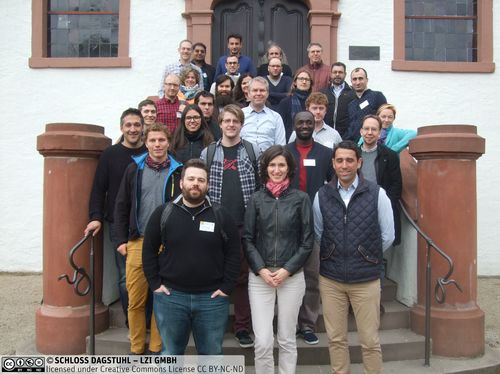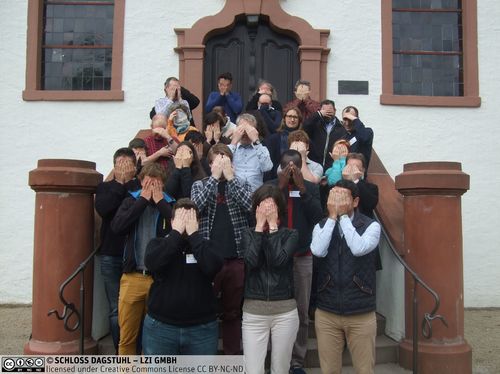Dagstuhl Seminar 17162
Online Privacy and Web Transparency
( Apr 17 – Apr 20, 2017 )
Permalink
Organizers
- Nataliia Bielova (INRIA Sophia Antipolis, FR)
- Nikolaos Laoutaris (Telefónica Research - Barcelona, ES)
- Arvind Narayanan (Princeton University, US)
- Nick Nikiforakis (Stony Brook University, US)
Contact
- Andreas Dolzmann (for scientific matters)
- Jutka Gasiorowski (for administrative matters)
The web has become an essential part of our society and is currently the main medium of information delivery. Billions of users browse the web on a daily basis, and there are single websites that have reached over one billion user accounts. In this environment, the ability to track users and their online habits can be very lucrative for advertising companies, yet very intrusive for the privacy of users.
Recent research has shown that third-party advertising networks and data brokers use a wide range of techniques in order to track users across the web - these techniques are used to reconstruct browsing sessions and to create profiles of users, inferring, among others, their hobbies, health status, political inclinations, and level of wealth. This information can be used to, not only deliver better targeted advertisements to users, but also to discriminate users, for example by providing customized prices for products based on a user’s willingness and ability to pay. To protect users, several solutions have been proposed, ranging from the laws, policies and the W3C Do-Not-Track candidate recommendation, to browser tools developed by companies and volunteers, and other client-side mechanisms proposed by researchers. At the same time, a number of tools have been developed to increase transparency on the web and allow end users to know when they are being tracked and when discrimination happens.
This Dagstuhl Seminar aims to address the open questions of how to protect user privacy and how to increase transparency on the web. The key objectives of the seminar are (i) review the state of the art in the field; (ii) identify key technical challenges and brainstorm potential solutions; (iii) understand how computer science research results can influence law and policy; (iv) discuss ethical and legal issues in privacy research.
The Dagstuhl Seminar will bring together scientists from the privacy and transparency communities, as well as policy makers interested in understanding how existing privacy laws and policies can be implemented, and representatives of Internet users organisations. The discussions will be inspired by the following questions and challenges:
Technology
- How can we detect tracking and algorithmic discrimination most effectively? What are the scientific and engineering challenges to overcome? What are the relative merits of automated, semi-automated, and crowdsourced approaches?
- How can we ensure that methodologies, techniques, and tools are shared across different communities working on this topic?
- How can we design the next generation of privacy tools, get users to actively use the tools, and generate data for privacy researchers to scrutinize?
- What are the tracking techniques and data collection practices on mobile devices and how do they compare to those on the web?
- What are the privacy and transparency issues raised by the Internet of Things, and how do we address them?
Law
- Do the current laws and policies cover existing tracking technologies? What is the process for reporting newly discovered tracking techniques to the appropriate Data Protection Authorities?
- Even with the appropriate legislation in place, how can we ensure that companies comply with the law? What can researchers do to help enforce compliance?
Ethical issues
- What is the best way to conduct web privacy research taking ethical issues into account?
- When does a study necessitate ethical review?
Users
- What is the most efficient way to raise user awareness about web tracking and transparency tools?
The Dagstuhl Seminar will create an interdisciplinary discussion forum with the goal of stimulating new research directions in the field of online privacy and web transparency and establishing new long-term collaborations. The results of the seminar may influence the laws and regulations in online privacy, provide new technologies to protect the privacy of web users, and increase users awareness through the new forms of transparency tools for the web.
 Nataliia Bielova, Nikolaos Laoutaris, Arvind Narayanan, and Nick Nikiforakis
Nataliia Bielova, Nikolaos Laoutaris, Arvind Narayanan, and Nick Nikiforakis
The Dagstuhl Seminar on Online Privacy and Web Transparency was the first seminar at Dagstuhl that gathered together researchers working in web applications, online privacy, transparency on the web, privacy enhancing technologies, privacy measurement, and network economics, as well as several representatives of law and policy discipline.
Research context
The web has become an essential part of our society and is currently the main medium of information delivery. Billions of users browse the web on a daily basis, and there are single websites that have reached over one billion user accounts. In this environment, the ability to track users and their online habits can be very lucrative for advertising companies, yet very intrusive for the privacy of users.
Recent research has shown that third-party advertising networks and data brokers use a wide range of techniques in order to track users across the web -- these techniques are used to reconstruct browsing sessions and to create profiles of users, inferring, among others, their hobbies, health status, political inclinations, and level of wealth. This information can be used to, not only deliver better targeted advertisements to users, but also to discriminate users, for example by providing customized prices for products based on a user’s willingness and ability to pay. To protect users, several solutions have been proposed, ranging from the laws, policies and the W3C Do-Not-Track candidate recommendation, to browser tools developed by companies and volunteers, and other client-side mechanisms proposed by researchers. At the same time, a number of tools have been developed to increase transparency on the web and allow end users to know when they are being tracked and when discrimination happens.
The seminar aimed to address the open questions of how to protect user privacy and how to increase transparency on the web. The key objectives of the seminar are (i) review the state of the art in the field; (ii) identify key technical challenges and brainstorm potential solutions; (iii) understand how computer science research results can influence law and policy; (iv) discuss ethical and legal issues in privacy research.
The seminar brought together scientists from the privacy and transparency communities, as well as policy makers interested in understanding how existing privacy laws and policies can be implemented, and representatives of Internet users organisations. The discussions at this Dagstuhl Seminar were strongly inspired by the following questions and challenges:
Technology
- How can we detect tracking and algorithmic discrimination most effectively? What are the scientific and engineering challenges to overcome? What are the relative merits of automated, semi-automated, and crowdsourced approaches?
- How can we ensure that methodologies, techniques, and tools are shared across different communities working on this topic?
- How can we design the next generation of privacy tools, get users to actively use the tools, and generate data for privacy researchers to scrutinize?
- What are the tracking techniques and data collection practices on mobile devices and how do they compare to those on the web?
- What are the privacy and transparency issues raised by the Internet of Things, and how do we address them?
Law
- Do the current laws and policies cover existing tracking technologies? What is the process for reporting newly discovered tracking techniques to the appropriate Data Protection Authorities?
- Even with the appropriate legislation in place, how can we ensure that companies comply with the law? What can researchers do to help enforce compliance?
Ethical issues
- What is the best way to conduct web privacy research taking ethical issues into account?
- When does a study necessitate ethical review?
Users
- What is the most efficient way to raise user awareness about web tracking and transparency tools?
 Nataliia Bielova, Nikolaos Laoutaris, Arvind Narayanan, and Nick Nikiforakis
Nataliia Bielova, Nikolaos Laoutaris, Arvind Narayanan, and Nick Nikiforakis
- Gunes Acar (KU Leuven, BE) [dblp]
- Benoit Baudry (INRIA - Rennes, FR) [dblp]
- Nataliia Bielova (INRIA Sophia Antipolis, FR) [dblp]
- Joe Calandrino (Federal Trade Commission - Washington, US) [dblp]
- David Choffnes (Northeastern University - Boston, US) [dblp]
- Damian Clifford (KU Leuven, BE) [dblp]
- Angel Cuevas Rumin (Univ. Carlos III - Madrid, ES) [dblp]
- Steven Englehardt (Princeton University, US) [dblp]
- Paul Francis (MPI-SWS - Kaiserslautern, DE) [dblp]
- Krishna P. Gummadi (MPI-SWS - Saarbrücken, DE) [dblp]
- Aniko Hannak (Central European University - Budapest, HU) [dblp]
- Costas Iordanou (Telefónica Research - Barcelona, ES) [dblp]
- Nicolas Kourtellis (Telefónica Research - Barcelona, ES) [dblp]
- Balachander Krishnamurthy (AT&T Labs Research - New York, US) [dblp]
- Nikolaos Laoutaris (Telefónica Research - Barcelona, ES) [dblp]
- Arnaud Legout (INRIA Sophia Antipolis, FR) [dblp]
- Timothy Libert (University of Pennsylvania - Philadelphia, US) [dblp]
- Arvind Narayanan (Princeton University, US) [dblp]
- Nick Nikiforakis (Stony Brook University, US) [dblp]
- Lukasz Olejnik (University College London, GB) [dblp]
- Josep M. Pujol (Cliqz - München, DE) [dblp]
- Konrad Rieck (TU Braunschweig, DE) [dblp]
- Dolière Francis Somé (INRIA Sophia Antipolis, FR) [dblp]
- Oleksii Starov (Stony Brook University, US) [dblp]
- Vincent Toubiana (CNIL - Paris, FR) [dblp]
- Michael Carl Tschantz (ICSI - Berkeley, US) [dblp]
- Peggy Valcke (KU Leuven, BE) [dblp]
- Robbert van Eijk (Leiden University Dual PhD Centre, NL) [dblp]
- Diana Vlad-Calcic (European Commission - Brussels, BE)
Related Seminars
- Dagstuhl Seminar 25042: Online Privacy: Transparency, Advertising, and Dark Patterns (2025-01-19 - 2025-01-22) (Details)
Classification
- security / cryptology
- society / human-computer interaction
- world wide web / internet
Keywords
- Online Privacy
- Transparency
- Web Tracking
- Discrimination
- Big data
- Privacy Enhancing Technologies



 Creative Commons BY 3.0 DE
Creative Commons BY 3.0 DE
